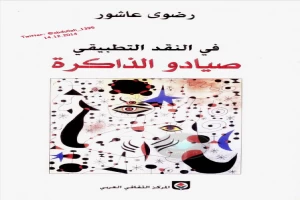Newly released
This book is new and will be uploaded as soon as it becomes available to us and if we secure the necessary publishing rights.

في النقد التطبيقي: صيادو الذاكرة Book PDF
(0)
Author:
Radwa AshourNumber Of Reads:
33
Language:
Arabic
Category:
literatureSection:
Pages:
250
Quality:
good
Views:
1148
Quate
Review
Save
Share
Book Description
Radwa Ashour
Radwa Ashour (born in Cairo, May 26, 1946) is an Egyptian storyteller, novelist, literary critic, and university professor. Her literary project, in its creative aspect, is characterized by themes of national and human liberation, in addition to the historical novel. Her critical works, published in Arabic and English, range from theoretical productions to works related to specific literary experiences. Some of her creative work has been translated into English, Spanish, Italian and Indonesian. Biography: Radwa Ashour was born in Cairo, 1946. She studied English at the Faculty of Arts at Cairo University, and after obtaining a master's degree in comparative literature, from the same university, she moved to the United States, where she obtained a doctorate from the University of Massachusetts, with a thesis on African-American literature . In 1977, Radwa Ashour published her first critical work, The Road to the Other Tent, about the literary experience of Ghassan Kanafani. In 1978, Gibran and Blake's book, Critical Study, which formed her thesis for obtaining a master's degree in 1972, was published in English. In November 1979, under President Anwar Sadat, her Palestinian husband, Mourid Barghouti, was prevented from residing in Egypt, which led to the separation of her family. In 1980, she published her last critical work, before she entered the fields of novel and story, entitled The Follower Rising, on the literary experiences of West Africa. Until 2001, her experience would be characterized by the exclusivity of creative works, fiction and fiction, the first of which was during the days of an Egyptian student in America (1983), which was followed by the publication of three novels (The Warm Stone, Khadija, Sawsan and Siraj) and the collection of short stories I saw the palm, in 1989. This stage culminated in the publication of her novel The historical Granada Trilogy, in 1994, thanks to which it won the Best Book Award for the year 1994 on the sidelines of the Cairo International Book Fair.
Book Currently Unavailable
This book is currently unavailable for publication. We obtained it under a Creative Commons license, but the author or publisher has not granted permission to publish it.
Rate Now
5 Stars
4 Stars
3 Stars
2 Stars
1 Stars
في النقد التطبيقي: صيادو الذاكرة Quotes
Top Rated
Latest
Quate
Be the first to leave a quote and earn 10 points
instead of 3
Comments
Be the first to leave a comment and earn 5 points
instead of 3